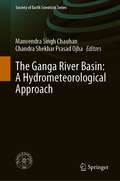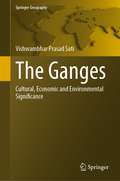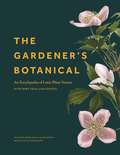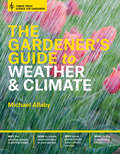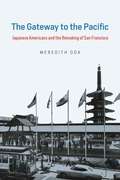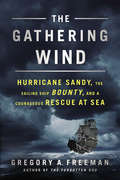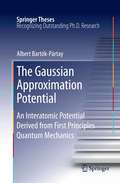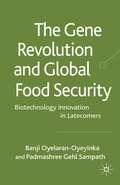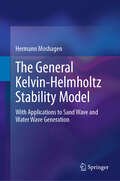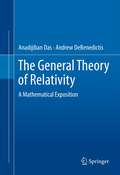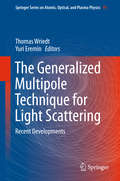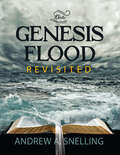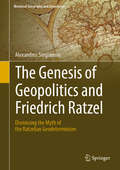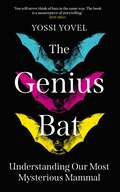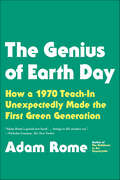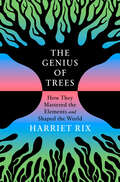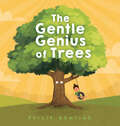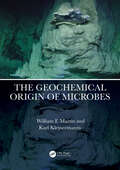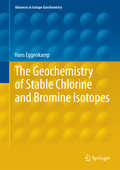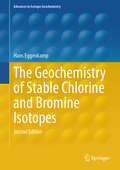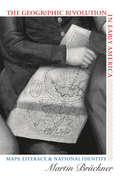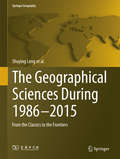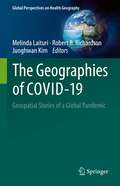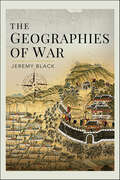- Table View
- List View
The Ganga River Basin: A Hydrometeorological Approach (Society of Earth Scientists Series)
by Manvendra Singh Chauhan Chandra Shekhar Prasad OjhaThis book presents an overview of the hydrometeorological and hydrological studies and assists in tackling challenges posed by climate and land use land cover changes. The Ganga River is one of the major living streams on the planet earth and very important river system in India. This holy river is a lifeline for approximately five hundred million people. In the last few decades, River Ganges has been subjected to tremendous pressures with respect to both water quantity and water quality. This situation, already one of the alarming magnitudes, has been further provoked by hydrometeorological changes resulting in droughts, floods and reduced groundwater levels and river flows in addition to the poor river health. Thus, it is imperative to assess the various complexities and possible solutions for better management of River Ganges. This book is a valuable addition to the literature and contributes to research on River Ganges which will help better planning and management of Ganga river basin. The hydrological and hydrometeorological aspects covered in this book help practitioners, researchers, policymakers and other stakeholders.
The Ganges: Cultural, Economic and Environmental Significance (Springer Geography)
by Vishwambhar Prasad Sati‘The Ganges: Cultural, Economic, and Environmental Importance’ is a geographical, cultural, economic, and environmental interpretation of the Ganga River. The Ganga River originates from Gaumukh- situated in the high Himalaya, flows through the world’s biggest fertile alluvial plain, and inlets into the Bay of Bengal at Ganga Sagar. It makes a unique natural and cultural landscape and is believed to be the holiest river of India. The Hindus called it ‘Mother Ganga’ and worship it. The towns/cities, situated on its bank, are world-famous and are known as the highland and valley pilgrimages. The water of the Ganga is pious, and the Hindus use it on different occasions while performing the rituals and customs. This book is unique because no previous study which presents a complete and comprehensive geographical description of the Ganga has been composed. This book presents the historical and cultural significance of the Ganga and its tributaries. Empirical, archival, and observation methods were applied to conduct this study. There are a total of 10 chapters in this book such as ‘Introduction’, ‘the Ganga Basin’, ‘Geography of the Ganga Basin’, ‘the Ganges System: Ganga and its Tributaries’, ‘Ganga between Gaumukh and Uttarkashi’, ‘the Major Cultural Towns’, ‘Major Fairs and Festivals’, ‘Economic Significance of the Ganga’, ‘Environmental Issues’, and ‘Conclusions’. The contents of the book are enriched by 89 figures, 15 tables, and substantial citations and references.
The Gardener's Botanical: An Encyclopedia of Latin Plant Names - with More than 5,000 Entries
by The Gardener's B Ross BaytonThe definitive guide to botanical Latin. Unlock the secrets of botanical Latin with this beautifully illustrated encyclopedia. The Gardener's Botanical contains definitions of more than 5,000 plant names—from abbreviatus ("shortened") to zonatus ("with bands")—along with more than 350 color illustrations. Scientific plant names are an invaluable tool for those who understand them. Formed from Greek and, more commonly, from Latin root words, not only do they make it possible for gardeners and botanists to communicate, they also contain a wealth of hidden information. The Gardener's Botanical is the key to unlocking these secrets. This guide contains a breathtaking array of botanical names in alphabetical order. Each word is listed with a pronunciation guide, definition, example plant, and, where appropriate, etymology. Also included in this illuminating guide are special features on important plant genera, fact boxes, essays focusing on the history and importance of Latin names and botanical illustrations, and an index of common names with more than 2,000 popular plants, cross-referenced with their binomial name in Latin.
The Gardener's Guide to Weather and Climate: How to Understand the Weather and Make It Work for You (Science For Gardeners Ser.)
by Michael Allaby“We owe it to our plants to read this book. After all, while we just live with the weather, our plants have to survive it.” —The Washington Post All gardeners are at the whim of Mother Nature, and so are our plants. Whether it’s coping with extreme drought or record-breaking snow fall, gardeners—and gardens—across the country are fighting against the elements. Instead of just reacting to the weather, Michael Allaby suggests that gardeners use knowledge about how the weather works to create the best growing conditions for their plants. Allaby brings big-picture atmospheric concepts to life with a comprehensive introduction to how weather works and explanations climate change, weather systems, and microclimates. The Gardener’s Guide to Weather and Climate proves that instead of gardening at the mercy of the weather, knowledgeable gardeners can make the weather work for them
The Gateway to the Pacific: Japanese Americans and the Remaking of San Francisco (Historical Studies of Urban America)
by Meredith OdaIn the decades following World War II, municipal leaders and ordinary citizens embraced San Francisco’s identity as the “Gateway to the Pacific,” using it to reimagine and rebuild the city. The city became a cosmopolitan center on account of its newfound celebration of its Japanese and other Asian American residents, its economy linked with Asia, and its favorable location for transpacific partnerships. The most conspicuous testament to San Francisco’s postwar transpacific connections is the Japanese Cultural and Trade Center in the city’s redeveloped Japanese-American enclave. Focusing on the development of the Center, Meredith Oda shows how this multilayered story was embedded within a larger story of the changing institutions and ideas that were shaping the city. During these formative decades, Oda argues, San Francisco’s relations with and ideas about Japan were being forged within the intimate, local sites of civic and community life. This shift took many forms, including changes in city leadership, new municipal institutions, and especially transformations in the built environment. Newly friendly relations between Japan and the United States also meant that Japanese Americans found fresh, if highly constrained, job and community prospects just as the city’s African Americans struggled against rising barriers. San Francisco’s story is an inherently local one, but it also a broader story of a city collectively, if not cooperatively, reimagining its place in a global economy.
The Gathering Wind
by Gregory A. FreemanFrom the author of The Forgotten 500 comes the heartbreaking, thrilling, and inspirational story of the impact of Superstorm Sandy upon the Bounty and its crew.
The Gaussian Approximation Potential
by Albert Bartók-PártaySimulation of materials at the atomistic level is an important tool in studying microscopic structures and processes. The atomic interactions necessary for the simulations are correctly described by Quantum Mechanics, but the size of systems and the length of processes that can be modelled are still limited. The framework of Gaussian Approximation Potentials that is developed in this thesis allows us to generate interatomic potentials automatically, based on quantum mechanical data. The resulting potentials offer several orders of magnitude faster computations, while maintaining quantum mechanical accuracy. The method has already been successfully applied for semiconductors and metals.
The Gene Revolution and Global Food Security: Biotechnology Innovation in Latecomers
by Banji Oyelaran-Oyeyinka Padmashree Gehl SampathUsing the concept of innovation capacity, this book, using recent field data from countries in Asia and Africa, competently demonstrates how biotechnology can contribute to sustainable economic development. The approach articulates the imperative for developing countries to build up specific capabilities backed up by policies and institutions.
The General Kelvin-Helmholtz Stability Model: With Applications to Sand Wave and Water Wave Generation
by Hermann MoshagenThis book presents a generalized version of the classical Kelvin-Helmholtz instability, a useful tool which allows for new approaches when studying stability problems in fluid mechanics, as well as its important applications. It begins by providing an introduction to hydrodynamic stability and the Kelvin-Helmholtz (KH) instability. The author then develops the general KH stability model for a multi-layer flow system, which includes the conventional KH instability as a special case. This book also includes the detailed discussion of two important applications of this model: the generation of sand waves in alluvial channels and the generation of wind waves on water. Additionally, the effects of nonlinearities and the use of computational methods to study KH instability are included. This book serves as a concise and modern treatment of the KH stability model with specific attention paid to hydrodynamic stability analysis. It is ideal for graduate students interested in fluid dynamics as well as scientists and engineers in the fields of oceanography, geophysics, offshore engineering, and more.
The General Theory of Relativity
by Andrew Debenedictis Anadijiban DasThe General Theory of Relativity: A Mathematical Exposition will serve readers as a modern mathematical introduction to the general theory of relativity. Throughout the book, examples, worked-out problems, and exercises (with hints and solutions) are furnished. Topics in this book include, but are not limited to: tensor analysis the special theory of relativity the general theory of relativity and Einstein's field equations spherically symmetric solutions and experimental confirmations static and stationary space-time domains black holes cosmological models algebraic classifications and the Newman-Penrose equations the coupled Einstein-Maxwell-Klein-Gordon equations appendices covering mathematical supplements and special topics Mathematical rigor, yet very clear presentation of the topics make this book a unique text for both university students and research scholars. Anadijiban Das has taught courses on Relativity Theory at The University College of Dublin, Ireland, Jadavpur University, India, Carnegie-Mellon University, USA, and Simon Fraser University, Canada. His major areas of research include, among diverse topics, the mathematical aspects of general relativity theory. Andrew DeBenedictis has taught courses in Theoretical Physics at Simon Fraser University, Canada, and is also a member of The Pacific Institute for the Mathematical Sciences. His research interests include quantum gravity, classical gravity, and semi-classical gravity.
The Generalized Multipole Technique for Light Scattering: Recent Developments (Springer Series on Atomic, Optical, and Plasma Physics #99)
by Thomas Wriedt Yuri EreminThis book presents the Generalized Multipole Technique as a fast and powerful theoretical and computation tool to simulate light scattering by nonspherical particles. It also demonstrates the considerable potential of the method. In recent years, the concept has been applied in new fields, such as simulation of electron energy loss spectroscopy and has been used to extend other methods, like the null-field method, making it more widely applicable. The authors discuss particular implementations of the GMT methods, such as the Discrete Sources Method (DSM), Multiple Multipole Program (MMP), the Method of Auxiliary Sources (MAS), the Filamentary Current Method (FCM), the Method of Fictitious Sources (MFS) and the Null-Field Method with Discrete Sources (NFM-DS). The Generalized Multipole Technique is a surface-based method to find the solution of a boundary-value problem for a given differential equation by expanding the fields in terms of fundamental or other singular solutions of this equation. The amplitudes of these fundamental solutions are determined from the boundary condition at the particle surface. Electromagnetic and light scattering by particles or systems of particles has been the subject of intense research in various scientific and engineering fields, including astronomy, optics, meteorology, remote sensing, optical particle sizing and electromagnetics, which has led to the development of a large number of modelling methods based on the Generalized Multipole Technique for quantitative evaluation of electromagnetic scattering by particles of various shapes and compositions. The book describes these methods in detail.
The Genesis Flood Revisited
by Andrew SnellingModeled after the 1961 ground-breaking book The Genesis Flood by Drs. Whitcomb and Morris, this detailed work builds on that classic volume with new insights from decades of work by the author, Dr. Andrew Snelling, and numerous colleagues. This recent revolution in geology and the explosion in geological research have established an even firmer basis for understanding the biblical Flood with a God-honoring foundation — the absolute authority and inerrancy of God’s Word. Examine details of the Creation Week as it builds a solid scriptural case for the Flood’s catastrophic nature and global extent. Find decisive answers to many questions about the Flood and Noah’s Ark, its construction, and the animals taken onboard. Delve deeply into astonishing geological details that unfold from the early chapters of Genesis, including the Creation Week and the pre-Flood world. Explore detailed evidence and a concise, informative 30-page color section with diagrams, maps, and more! Dr. Snelling jettisons the faulty evolutionary-uniformitarian assumptions used by most geologists and instead, interprets compelling new geological and observed field data within the biblical framework for the earth’s history. He also demonstrates that fossils were catastrophically buried in sedimentary layers being deposited rapidly on a global scale on the continental plates derived from the violent rifting apart of the original supercontinent. His work demolishes radiometric dating, the icon of the millions of years dogma, and builds a thoroughly powerful case for a young earth that explains many geological features such as varves, evaporites, coal, oil, chalk, granites, and more that biblical skeptics sadly have used to scoff at God’s Word. Discover the powerful truth behind the earth’s most enduring mysteries!
The Genesis of Geopolitics and Friedrich Ratzel: Dismissing The Myth Of The Ratzelian Geodeterminism (Historical Geography and Geosciences)
by Alexandros StogiannosThis book discusses the influence of Friedrich Ratzel's ideas in more contemporary geopolitical analytical systems and the geodeterminism commonly attributed to him. The author thoroughly analyzes the structural components of Ratzel's thought. The research is inspired by the numerous contradictory approaches in the secondary literature, presenting Ratzel as both humanist and racist, geo-determinist and multidimensional analyst, organicist and social scientist, precursor of Geopolitics and opponent to the same idea. In this work, more particular issues are approached: the establishment of a scientific Political Geography; the methodological approach of his multidisciplinary work; the redefinition of his geopolitical period; his notion of state and the evaluation of sociological and cultural parameters as factors of state power; the biogeographical content of the notion of Lebensraum; his attitude towards the racist theories as well as towards the Darwinian theories; his overall worldview and the confrontation with cosmopolitism; his contribution to an interdisciplinary, positivist and scientific approach in analyzing social and international affairs; his thoughts on the architecture of Europe. The book will be useful for researchers and students in many scientific fields, such as International Relations, Geopolitics, Geography and History of Geography.
The Genius Bat: Understanding Our Most Mysterious Mammal
by Yossi YovelStep into the shadows and listen 'Brings the poster-species of Halloween out of the shadows, so we can better appreciate the flying mammal.' National Geographic Usually, you&’ll hear a bat before you see it – the gentle flutter of wings, their high-pitched chatter as they dive and roll for insects. Only occasionally do you spot them, a blur against the evening sky. With nearly 1,500 known species, bats are among the most successful mammals on earth. From the tiny bumblebee bat – which could rest comfortably on your index finger – to the giant golden-crowned flying fox with its 1.5-metre wingspan, they are evolutionary marvels, adapted to practically every environment. The only mammal that can fly, they can reach speeds of up to 100 mph, leaving cheetahs in the dust. Yossi Yovel, an ecologist and neurobiologist, is passionate about deciphering their secrets. In The Genius Bat, he brings to life these amazing creatures as well as the obsessive and sometimes eccentric people who study them. From muddy rainforests to star-covered deserts, from guest houses in Thailand to museum drawers full of fossils in New York, this is an eye-opening account of a remarkable animal. 'A marvellous book.' Nancy Simmons, Curator of Mammalogy, American Museum of Natural History 'Fascinating... Yovel clearly explains bats' vital contributions to a healthier planet.' Merlin Tuttle, author of The Secret Lives of Bats and founder of Bat Conservation International
The Genius of Earth Day: How a 1970 Teach-In Unexpectedly Made the First Green Generation
by Adam RomeThe first Earth Day is the most famous little-known event in modern American history. Because we still pay ritual homage to the planet every April 22, everyone knows something about Earth Day. Some people may also know that Earth Day 1970 made the environmental movement a major force in American political life. But no one has told the whole story before. The story of the first Earth Day is inspiring: it had a power, a freshness, and a seriousness of purpose that are difficult to imagine today. Earth Day 1970 created an entire green generation. Thousands of Earth Day organizers and participants decided to devote their lives to the environmental cause. Earth Day 1970 helped to build a lasting eco-infrastructure—lobbying organizations, environmental beats at newspapers, environmental-studies programs, ecology sections in bookstores, community ecology centers. In The Genius of Earth Day, the prizewinning historian Adam Rome offers a compelling account of the rise of the environmental movement. Drawing on his experience as a journalist as well as his expertise as a scholar, he explains why the first Earth Day was so powerful, bringing one of the greatest political events of the twentieth century to life.
The Genius of Trees: How They Mastered the Elements and Shaped the World
by Harriet RixA mind-expanding exploration of how trees learned to shape our world by manipulating the elements, plants, animals, and even humankind, possessing agency beyond anything we might have imagined&“Astounding . . . a true masterpiece . . . Rix refuses to put herself much in the picture, but through the scenes we glimpse an Indiana Jones figure who is both an eminent, travelling scientist and a born writer.&”—The TelegraphFor a supposedly stationary life-form, trees have demonstrated an astonishing mastery over the environment around them. In The Genius of Trees, tree scientist Harriet Rix reveals the inventive ways trees sculpt their environment and explains the science of how they achieve these incredible feats. Taking us on an awe-inspiring journey through deep history and unseen biochemistry across the globe, Rix restores trees to their rightful station, not as victims of our negligence but as ingenious, stunningly inventive agents in a grand ecological narrative. Trees manipulate fundamental elements, plants, animals, bacteria, fungi, and even humankind to achieve their ends, as seen with oaks in Devon, England, shaping ecosystems through root networks and fungi, and in Amedi, Iraq, changing sexes as they age; laurel rainforests in the Canary Islands regulating water cycles; and metasequoias in California influencing microclimates.Some tree species have gone to extraordinary lengths to make sure their fruits reach large primates, who can spread their seeds over vast distances, while poisoning smaller and less useful mammals. Others can split solid rock and create fertile ground in barren landscapes, effectively building entire ecosystems from scratch. And new discoveries are constantly coming to light: research has shown that trees have an even greater role in preventing global warming than we thought--trees, at one time thought to produce methane actually consume it. We share one world with trees and one need for survival.This eye-opening journey into the inner lives of nature&’s most powerful plant is a profoundly new and original way of understanding both the miracles trees perform and the glories of our natural world.
The Gentle Genius of Trees
by Philip BuntingLet trees teach you everything from how to branch out to how to stay rooted in this delightful blend of nonfiction and inspirational humor by author-illustrator Philip Bunting!What could we clever humans ever learn from trees? Find out when you take a stroll through the woods and learn a few life lessons from our foliaged friends in this truly special book filled with graphic illustrations. With humor and heart, readers will encounter a small forest of facts. They'll explore the brilliance of trees in creating one interconnected wood-wide web that enables their community to collaborate with each other, share resources, warn of threats, and survive and thrive together.
The Geochemical Origin of Microbes
by William F. Martin Karl KleinermannsThis is a textbook covering the transition from energy releasing reactions on the early Earth to energy releasing reactions that fueled growth in the first microbial cells. It is for teachers and college students with an interest in microbiology, geosciences, biochemistry, evolution, or all of the above. The scope of the book is a quantum departure from existing “origin of life” books in that it starts with basic chemistry and links energy-releasing geochemical processes to the reactions of microbial metabolism. The text reaches across disciplines, providing students of the geosciences an origins/biology interface and bringing a geochemistry/origins interface to students of microbiology and evolution. Beginning with physical chemistry and transitioning across metabolic networks into microbiology, the timeline documents chemical events and organizational states in hydrothermal vents – the only environments known that bridge the gap between spontaneous chemical reactions that we can still observe in nature today and the physiology of microbes that live from H2, CO2, ammonia, phosphorus, inorganic salts and water. Life is a chemical reaction. What it is and how it arose are two sides of the same coin.Key Features Provides clear connections between geochemical reactions and microbial metabolism Focuses on chemical mechanisms and transition metals Richly illustrated with color figures explaining reactions and processes Covers the origin of the Earth, the origin of metabolism, the origin of protein synthesis and genetic information as well as the escape into the wild of the first free-living cells: Bacteria and Archaea
The Geochemistry of Stable Chlorine and Bromine Isotopes
by Hans EggenkampThis book provides detailed information on the history, analysis and applications of chlorine and bromine isotope geochemistry. Chlorine and bromine are geochemically unique as they prefer to exist as single charged negative ions. For this reason isotope fractionation reflects mostly processes that are not related to changes in the redox state and this fractionation is generally modest. The book will describe the processes that are most easily detected using these isotopes. Also isotope variations, and processes that cause them, measured in oxidised species such as perchlorates and in organic molecules will be described in this book.
The Geochemistry of Stable Chlorine and Bromine Isotopes (Advances in Isotope Geochemistry)
by Hans EggenkampThis book provides detailed information on the history, analysis and applications of chlorine and bromine isotope geochemistry. Chlorine and bromine are geochemically unique as they prefer to exist as single charged negative ions. For this reason isotope fractionation reflects mostly processes that are not related to changes in the redox state and this fractionation is generally modest. The book will describe the processes that are most easily detected using these isotopes. Also isotope variations, and processes that cause them, measured in oxidised species such as perchlorates and in organic molecules will be described in this book.
The Geochemistry of Stable Chlorine and Bromine Isotopes (Advances in Isotope Geochemistry)
by Hans EggenkampThis book provides detailed information on the history, analysis and applications of chlorine and bromine isotope geochemistry. This largely extended 2nd edition has incorporated most research published between 2014 and 2023, and contains also significantly more information on the earliest experimental data obtained during the early 20th century. This 2nd edition describes isotope studies done on terrestrial samples, and also incorporates the fascinating chlorine (and bromine) isotope ratio investigations obtained from extraterrestrial and astronomical studies, and thus it shows the full extent of the current status of knowledge of this subject.
The Geographic Revolution in Early America
by Martin BrücknerThe rapid rise in popularity of maps and geography handbooks in the eighteenth century ushered in a new geographic literacy among nonelite Americans. In a pathbreaking and richly illustrated examination of this transformation, Martin Bruckner argues that geographic literacy as it was played out in popular literary genres--written, for example, by William Byrd, George Washington, Thomas Jefferson, Royall Tyler, Charles Brockden Brown, Meriwether Lewis, and William Clark--significantly influenced the formation of identity in America from the 1680s to the 1820s. Drawing on historical geography, cartography, literary history, and material culture, Bruckner recovers a vibrant culture of geography consisting of property plats and surveying manuals, decorative wall maps and school geographies, the nation's first atlases, and sentimental objects such as needlework samplers. By showing how this geographic revolution affected the production of literature, Bruckner demonstrates that the internalization of geography as a kind of language helped shape the literary construction of the modern American subject. Empirically rich and provocative in its readings, The Geographic Revolution in Early America proposes a new, geographical basis for Anglo-Americans' understanding of their character and its expression in pedagogical and literary terms.
The Geographical Sciences During 1986—2015
by Liping Zhu Xi Chen Qiuhong Tang Shuying Leng Xizhang Gao Tao Pei Guoyou Zhang Liangfu Chen Canfei He Daming He Xiaoyan Li Chunye Lin Hongyan Liu Weidong Liu Yihe Lü Shilong Piao Fulu Tao Lide Tian Xiaohua Tong Cunde Xiao Desheng Xue Linsheng Yang Linwang Yuan Yuanming Zheng Huiyi ZhuIn four chapters and an introduction, this book systematically helps readers understand the development of the Geographical Sciences both in China and in the world during the past 30 years. Through data analysis of methodologies including CiteSpace, TDA, qualitative analysis, questionnaires, data mining and mathematical statistics, the book explains the evolution of research topics and their driving factors in the Geographical Sciences and its four branches, namely Physical Geography, Human Geography, Geographical Information Science and Environmental Geography. It also identifies the role of the Geographical Sciences in the analysis of strategic issues such as global change and terrestrial ecosystems, terrestrial water cycle and water resources, land change, global cryosphere evolution and land surface processes on the Tibetan Plateau, economic globalization and local responses, regional sustainable development, remote sensing modelling and parameter inversion, spatial analysis and simulation, and tempo-spatial processes and modelling of environmental pollutants. It then discusses research development and inadequacy of Chinese Geographical Sciences in the above-mentioned topics, as well as in the fields including Geomorphology and Quaternary environmental change, Ecohydrology, ecosystem services, the urbanization process and mechanism, medical and health geography, international rivers and transboundary environment and resources, detection and attribution of changes in land surface sensitive components, and uncertainty of spatial information and spatial analysis. It shows that the NSFC has driven the development in all these topics and fields. In addition, the book summarises trends of the Geographical Sciences in China and the research level in major countries of the world through an overview of geographical education in colleges and universities, the analysis of publications, citations and author networks of SCI/SSCI and CSCD indexed articles, and the description of Sino-USA, Sino-UK and Sino-German cooperation. This book serves as an important reference to anyone interested in geographical sciences and related fields.
The Geographies of COVID-19: Geospatial Stories of a Global Pandemic (Global Perspectives on Health Geography)
by Melinda Laituri Robert B. Richardson Junghwan KimThis volume of case studies focuses on the geographies of COVID-19 around the world. These geographies are located in both time and space concentrating on both first- and second-order impacts of the COVID-19 pandemic. First-order impacts are those associated with the immediate response to the pandemic that include tracking number of deaths and cases, testing, access to hospitals, impacts on essential workers, searching for the origins of the virus and preventive treatments such as vaccines and contact tracing. Second-order impacts are the result of actions, practices, and policies in response to the spread of the virus, with longer-term effects on food security, access to health services, loss of livelihoods, evictions, and migration. Further, the COVID-19 pandemic will be prolonged due to the onset of variants as well as setting the stage for similar future events. This volume provides a synopsis of how geography and geospatial approaches are used to understand this event and the emerging “new normal.” The volume's approach is necessarily selective due to the global reach of the pandemic and the broad sweep of second-order impacts where important issues may be left out. However, the book is envisioned as the prelude to an extended conversation about adaptation to complex circumstances using geospatial tools.Using case studies and examples of geospatial analyses, this volume adopts a geographic lens to highlight the differences and commonalities across space and time where fundamental inequities are exposed, the governmental response is varied, and outcomes remain uncertain. This moment of global collective experience starkly reveals how inequality is ubiquitous and vulnerable populations – those unable to access basic needs – are increasing. This place-based approach identifies how geospatial analyses and resulting maps depict the pandemic as it ebbs and flows across the globe. Data-driven decision making is needed as we navigate the pandemic and determine ways to address future such events to enable local and regional governments in prioritizing limited resources to mitigate the long-term consequences of COVID-19.
The Geographies of War
by Jeremy BlackA global history of the geography of war from antiquity to modern and contemporary conflict illustrated and brought to life by histories of inter-state war, geopolitical rivalry, 'hot' and 'cold' war and terrorism. Geography is a basic element in all stages of war including preparation, planning, onset of conflict, waging wars, assessment of results, post-conflict negotiations, analysis and preparation for future conflict. Geography is the vital element in strategy and tactics, and in the spatial context, on land, water and space. It is central to all historical activities from human and animal transport to wind power, coal, seam, oil, jet propulsion atomic weaponry and the threat of cyber conflict. This is essentially a 'modern geography', and not only physical, but political social, economic, cultural and 'human', with emphasis on personal experience. And technical mapping is included - the author's particular expertise - and accessible to specialist and general readers. A global history of the geographies of war in the context of great power geopolitics to local conflicts.
